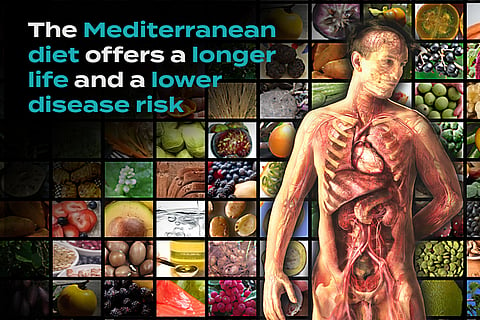Bridging the Gap - Health Equity for all
The Key to a Longer, Disease-Free Life Starts at Your Dinner Plate
<p>Every year, millions of Americans go on diets, and while their goals might look similar, the paths they take are wildly different. From wacky experiments in other centuries like the grape- or banana-only diets through to the more familiar Atkins and Paleo diets, the trends come and go but the goals remain largely the same.</p>
<p>One dietary pattern more than any other has stood the test of time: the Mediterranean diet.</p>
<p><strong>Southern cuisine. </strong>Rooted in the culinary cultures of nations bordering the Mediterranean, this approach to food and drink has attracted the attention of nutritionists and researchers for its potent ability to promote health and wellbeing.</p>
<p><strong>Core concept. </strong>Going Mediterranean means emphasizing plant-based food, healthy fats, lean protein, and moderate wine consumption. Science says that the people of Greece, Spain, and Italy are onto something with their prioritization of fresh seasonal ingredients in meals among friends and family.</p>
<p><strong>The components of the Mediterranean diet.</strong></p>
<ul>
<li><strong>Fruits and vegetables.</strong> This is the foundation of the diet. An abundance of fruits and veg provides essential vitamins, minerals, and antioxidants. These colorful staples can be consumed raw or cooked, adding vibrancy and flavor to your meals.<br/>
</li>
<li><strong>Whole grains.</strong> Rich in fiber, vitamins, minerals, and other nutrients, the whole-grain variation trumps refined grains every day of the week. Oats, rye, barley, corn, buckwheat, whole wheat bread, and whole grain pasta are your friends here. These grains help you to feel full and regulate blood sugar levels.<br/>
</li>
<li><strong>Healthy fats.</strong> Olive oil is celebrated as the go-to fat source in the Mediterranean diet because of its heart-healthy monounsaturated fats and anti-inflammatory properties. Other sources of healthy fats include nuts, seeds, and fatty fish like salmon, which provides beneficial omega-3 fatty acids.<br/>
</li>
<li><strong>Lean proteins</strong>. Meat isn’t ruled out, but the Mediterranean diet favors leaner options like poultry and fish. These protein sources offer excellent nutrition. Legumes like beans, peas, lentils, peanuts, and chickpeas are also on the menu as protein sources.<br/>
</li>
<li><strong>Red wine.</strong> If you’re going to imbibe, do it right: red wine, when enjoyed in moderation, is a classic feature of the Mediterranean diet. It’s rich in antioxidants like resveratrol and is linked to various health benefits when consumed responsibly.</li>
</ul>
<figure>
<figcaption>
<figure><img alt="Mediterranean diet foods | Source: G.steph.rocket/Wikimedia" class="img-responsive" src="https://cdn.storymd.com/optimized/6qym8pU5q1/thumbnail.jpg" />
<figcaption>Mediterranean diet foods. <em>Source: G.steph.rocket/Wikimedia</em></figcaption>
</figure>
</figcaption>
</figure>
<p><strong>Research on the Mediterranean diet.</strong> A great deal of research has underlined the health-promoting properties of the Mediterranean diet. Study after study has linked this diet to a lower risk of chronic diseases and a longer lifespan. </p>
<ul>
<li><strong>Heart health.</strong> Enhanced heart health is among the most renowned aspects of the Mediterranean diet. Studies have shown that sticking to it consistently can lower levels of LDL cholesterol ("bad" cholesterol), lower blood pressure, and decrease the risk of heart disease and stroke.<br/>
</li>
<li><strong>Weight management.</strong> The focus on whole, nutrient-dense foods makes for an effective tool in weight management. The high fiber content promotes satiety, and the healthy fats can aid in regulating your appetite.<br/>
</li>
<li><strong>Brain booster.</strong> Research suggests that the Mediterranean diet may offer protection for your cognitive function and reduce the risk of devastating diseases like Alzheimer's. The combo of antioxidants, omega-3 fatty acids, and anti-inflammatory foods is thought to boost brain health and resilience.<br/>
</li>
<li><strong>Diabetes prevention.</strong> Healthy eating is the key to managing blood sugar, and you can help prevent or manage type 2 diabetes with this diet. Whole grains, legumes, and monounsaturated fats promote stable blood sugar levels and enhance insulin sensitivity.<br/>
</li>
<li><strong>Longevity.</strong> Most famously, the Mediterranean diet is linked to a longer life. Studies have found that Mediterranean populations experience lower rates of age-related diseases and enjoy longer lives compared to other parts of the world.</li>
</ul>
<p><strong>How do I make the switch? </strong>Transitioning to a Mediterranean-style eating pattern doesn't have to be a chore. Begin by bringing small changes into your routine, such as:</p>
<ul>
<li>Get some extra servings of veg into your meals</li>
<li>Avoid added sugars, processed meat, and refined grains as much as you can</li>
<li>Make olive oil your #1 cooking fat</li>
<li>Enjoy fish at least twice a week</li>
<li>Snack on nuts and seeds instead of processed junk</li>
<li>Consume low to moderate amounts of poultry, eggs, cheese, and yogurt</li>
<li>Savor a glass of red wine with dinner, if you feel like it</li>
</ul>
<h2>More on the Mediterranean Diet</h2><ul><li><a href="https://soulivity.storymd.com/journal/j44a3r2fnj-mediterranean-diet" target="_blank">The Mediterranean Diet: Heart-Healthy Approach to Eating</a></li><li><a href="https://soulivity.storymd.com/journal/yj5dgvk0nm-diets" target="_blank">Diet Plans: Anti-Inflammatory, DASH, Elimination, Low FODMaP, Vegetarian</a></li><li><a href="https://soulivity.storymd.com/journal/nwlv4eycem-healthy-eating" target="_blank">Healthy Eating for a Healthy Life</a></li></ul>


